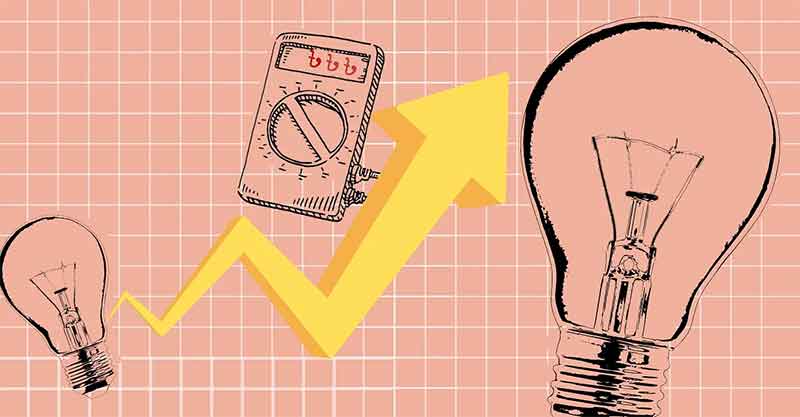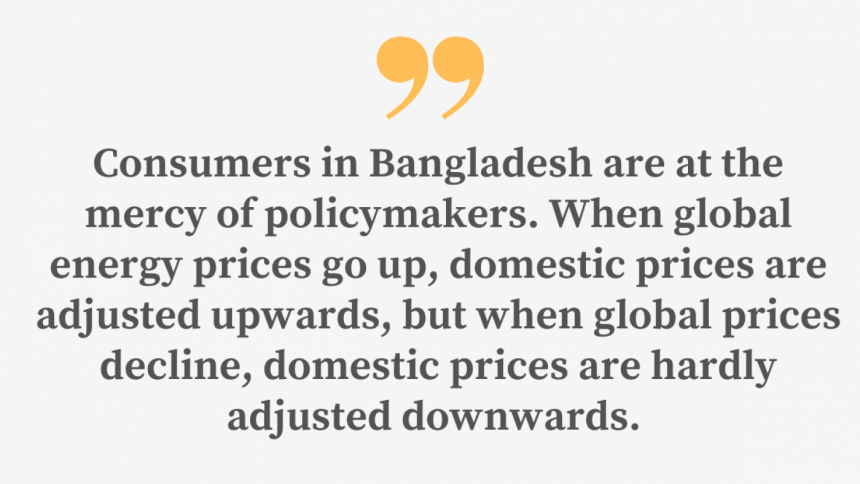Originally posted in The Daily Star on 30 January 2023
 Our financial situation, which is already in trouble due to high inflation, is getting further aggravated by the frequent energy price hikes that have been taking place in Bangladesh in recent times. Last year ended with a bulk electricity tariff hike of 19.92 percent, effective from December. This year started with a couple of similar announcements. In early January, the government announced an increase of electricity price by five percent per unit on average at the consumer level, effective from this month. Then came the announcement of gas price hikes for power, industries, captive power and commercial sectors, at rates ranging from 14 percent to 179 percent, on January 18. These new rates will be effective from February 1.
Our financial situation, which is already in trouble due to high inflation, is getting further aggravated by the frequent energy price hikes that have been taking place in Bangladesh in recent times. Last year ended with a bulk electricity tariff hike of 19.92 percent, effective from December. This year started with a couple of similar announcements. In early January, the government announced an increase of electricity price by five percent per unit on average at the consumer level, effective from this month. Then came the announcement of gas price hikes for power, industries, captive power and commercial sectors, at rates ranging from 14 percent to 179 percent, on January 18. These new rates will be effective from February 1.
Earlier in June 2022, the government increased gas prices at the retail level. In August, they raised the prices of various types of fuel when global prices were on a decline. In November 2021, they increased diesel and kerosene prices.

Volatile energy prices in the global market, high prices of imported LNG in the spot market, lack of domestic production, and expensive US dollars have led the government to take drastic measures. Since the Bangladesh Petroleum Corporation (BPC) is incurring losses and has little resources to import fuel from the global market, the government has no other option but to raise prices and reduce subsidies.
Sadly, BPC’s loss is not new, and global energy prices cannot be entirely blamed for that. The institution has been under the spotlight for resource wastage, system loss, and weak management and governance. Experts have pointed out that BPC’s accounting system is not transparent. As a result, even when it made profits during periods of low global energy prices, particularly between FY2014-15 and FY2021-22, the net result was not visible – people did not benefit from those profits.
Consumers in Bangladesh are at the mercy of policymakers. When global energy prices go up, domestic prices are adjusted upwards, but when global prices decline, domestic prices are hardly adjusted downwards. In 2016, energy prices were reduced by a very small amount when global prices declined.
Coincidentally, fuel prices are being adjusted upwards at a time when Bangladesh is seeking a loan of USD 4.5 billion from the IMF in the face of declining foreign exchange reserves. IMF delegates visited Bangladesh twice to discuss the loan. Clearly, the government is under pressure to withdraw subsidies and implement reforms to strengthen the country’s banking system and improve the fiscal framework. Energy price hikes are a reflection of this attempt to follow IMF guidelines. It is also easy for policymakers, since the burden of subsidy withdrawal can be imposed on common people who don’t have any say in the process. One wonders if the other suggestions made by the IMF would be implemented with equal seriousness. It is to be seen what results the energy price hike will bring for consumers and the economy.

The idea of eliminating subsidies is valid. Resources that are priced below the market price are depleted faster. Subsidies encourage waste of resources. Therefore, resources such as energy, which are key to economic growth, must be priced appropriately. The pricing mechanism should be transparent, but so far, it has been arbitrary. Energy prices have been generally set by the Bangladesh Energy Regulatory Commission (BERC) through public hearings. However, the cabinet recently approved an amendment to the BERC Act, 2003, which empowers the government to determine fuel tariff under special circumstances without public hearings.
Like many developing countries, the Bangladesh government subsidises some sectors. Subsidies constitute almost two percent of GDP, and a lion’s share of them is spent on fuel. But they are enjoyed by both the rich and the poor, which is inefficient. Though global price hikes are being used as a reason to withdraw subsidies, it is actually for the distribution of BPC’s loss, incurred mainly due to its inefficiencies, among the citizens.
Measures to withdraw subsidies are also being implemented at a time when people are struggling to make ends meet. Instead of a sudden withdrawal, subsidies should be phased out, giving people time to absorb the shock gradually. Besides, some critical sectors such as agriculture will have to be supported for some time to ensure food security. There is also a need for targeted support to poor and low-income households, and small businesses.
High electricity and gas prices may worsen inflationary pressures. The cost of production in industries will increase, hence, the cost of goods and services may increase too, and consumers’ purchasing power will be affected. The industrial sector is likely to suffer seriously due to high gas tariffs. There has always been a demand from the business community for uninterrupted gas supply for smooth production and cost management.
Now, with higher gas prices, they may lose competitiveness in the global market. For example, many readymade garments’ orders that came a few months ago, when the gas price was lower, will see higher production costs, but exporters cannot ask for a higher price from buyers now. Though gas prices have not been raised for households, certain sectors may try to take advantage of this difficult situation and pass the costs onto consumers. This calls for strong management and monitoring of the market.
The government must extend generous support to poor and low-income families through targeted measures to shield them from the negative impact of high inflationary pressure due to high food and fuel prices. Strict implementation of austerity measures, and more importantly, stemming resource wastage and corruption can save a lot of resources, which can then be used to protect people from energy poverty.
Dr Fahmida Khatun is executive director at the Centre for Policy Dialogue (CPD). Views expressed in this article are the author’s own.


